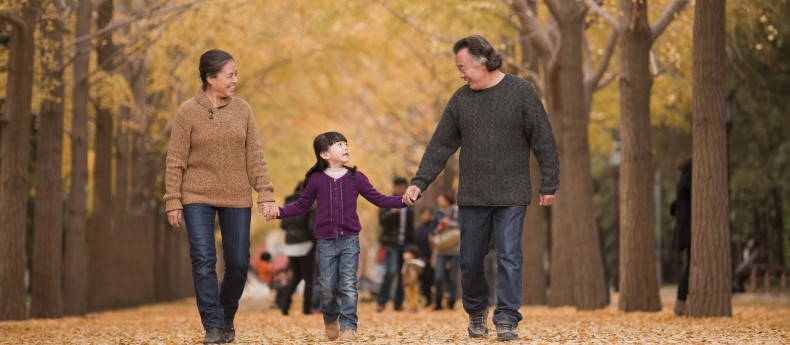
Top Wellness Tips for Beijing Newcomers
Most people who are new to Beijing, no matter where they are from, have the same health concerns: How can I make my kids safe? Where can I find good foods? Just how bad is the air? As a long-term expat and as a family doctor at BJU, I’ve tried to summarize the top issues that newcomers should be aware of — and how we all can stay healthy.
Acknowledge the Air Pollution, But Don’t Be Controlled by It
Yes, it’s true: Beijing’s air is among the most polluted in the world, with a daily average Air Quality Index of about 140, which likely is much higher than your home (if you come from another country). This may be a serious health concern if you or your children have lung or heart disease. But healthy people may also have problems on severely polluted days. I think the #1 step is to acknowledge this issue — but you should still enjoy the outdoor wonders of Beijing on the clearer days. Many Beijing residents follow the AQI index from the U.S. Embassy’s monitor, at iphone.bjair.info. In general, an AQI over 200 is especially unhealthy, and children at home and at school should be restricted from outdoor activities. Many Beijing residents also wear air pollution masks; look for the N95 rating on the masks to check for quality and effectiveness.
Buy Organic Food
Food safety is a major concern all over China, and organic food generally receives more government oversight than food from the average local farm. Thus, organic farms are more likely to be free of toxic levels of pesticides and chemicals. As to where to buy your organics, it’s best to stick with the big chain stores because they have more money to invest in their own supply chain. These include Walmart, Carrefour, Tesco, and Auchan. The local supermarket brand Jingkelong is developing a good supply chain and distribution. And there are a number of local organic farms that offer special deliveries as well as special memberships and occasional farm visits. This can be very rewarding and fun for families. Many Beijing residents shop at the import-focused chains April Gourmet and Jenny Lou’s, which have small sections of organics, as well as the organic focused Lohao City.
Buy A Bike
Beijing’s streets can be dangerous with the growing car population sharing roadways with pedestrians, pedal bikes and exploding numbers of electric bikes. However, I do think everyone should get a bike and use it as much as possible. Firstly, biking continues to be the most convenient transport around many parts of Beijing and often may be faster than a car. Plus, the exercise value is tremendous, and biking in Beijing’s pollution is still healthier than not exercising at all. But the #1 reason for my love of biking is the deep connection I feel to real Beijing; there’s simply nothing like biking through the old hutong neighborhoods, especially at night. It’s one of those unique Beijing moments you will really miss once you leave here. Note: Helmets are rarely worn by locals but are lifesavers for you and your children.
Take Control of Indoor Air
Many of us spend so much energy worrying about outdoor air that we forget that 90% of our time is spent indoors. Air quality indoors can often be just as bad, or worse, than it is outside. Fortunately, we have a lot more control over our homes and offices than we do over our outside world. If you protect your 90% indoor time with well-made air purifiers, special air-scrubbing plants and proper ventilation – coupled with knowing when to open or close your windows, then you can literally breathe easier and relax about your time here in Beijing.
To Everything, There Is A Season
Beijing has surprising seasonal variety. Spring and fall, the best times of year here, are unfortunately short, but you can expect the same general seasonal variations you would find in New England or northern Europe. Each season has its own particular oddities:
Summer’s major health issues include a major increase in gastroenteritis as well as travel-related diseases from vacations to exotic (and malaria-rampant) south Asian locales. The best way to prevent a vacation disaster is to do early research into your destination’s health status on the U.S. CDC Travel Web site; and bring a medical travel kit to help when you meet the often inevitable issues like diarrhea. Prepare early; you may need at least a month or more to get a full course of vaccines like Japanese encephalitis, rabies or hepatitis. These are often in short supply at the expat clinics during the summer crunch.
Autumn is fairly mellow, in terms of health issues, so you should enjoy this all-too-brief moment of perfect weather by exploring Beijing’s mountains and tourist attractions.
Winter can be monotonously cold but is usually dry with clear skies. The worst health problems usually include colds, influenza and winter depression. The secret to avoiding the winter blues? Pamper yourself! Here are some of my favorite winter tips: keep your skin moist; visit a local hot spring resort and take vitamin D.
Spring is a visual feast: in March we get sandstorms, and in May we have catkin pollen filling the air like snow. Sandstorms can be a health hazard to your lungs, but if you use a little common-sense avoidance, you’ll be fine. Many Beijingers do experience allergic hay fever in the spring, but quite a few actually have fewer symptoms than they would elsewhere. As for springtime fun, you should definitely join the rest of Beijing by flocking to local parks for the beautiful spring blossom festivals. Enjoy the local outdoors as much as you can before summer’s always-too-early heat kicks in.
Watch Out for Sexually Transmitted Diseases
Beijing is not immune to the worldwide problem of sexually transmitted diseases, and it is common here to be exposed to bugs such as chlamydia and gonorrhea. There is also an alarming resurgence of syphilis in China in addition to the usual suspects like HIV, herpes, hepatitis and others. Thus, there are many reasons for you to practice safe sex — that means always wearing a condom with new partners. And be careful where you buy your condoms; there have been recent scares with poorly made counterfeits. You should buy only from the big chain stores. And don’t forget that you can carry STD infections for many years and feel perfectly healthy but still infect others. That’s why we recommend routine screenings for sexually active men and women. These tests can give you a lot of peace of mind, especially if you are entering a new relationship.
Live An Anti-Inflammatory Lifestyle
I find it useful to picture Beijing as a pro-inflammatory city. Pro-inflammatory means causing free radical damage to our healthy cells, as well as setting off cascades of unhealthy hormones and enzymes that can slowly lead to many illnesses such as heart disease and cancers. We are bombarded daily with air particles and gases both indoors and outdoors, as well as from chemicals in our foods, that are pro-inflammatory. It always helps to ask, “What can I do to fight off this damage?” Fortunately, you can do a lot of things: don’t smoke; watch your alcohol intake; and eat anti-inflammatory foods such as fruits and vegetables. Some modern foods can be decidedly pro-inflammatory and should be avoided, such as trans-fats and certain red meats like meat from grain-fed cows.
Exercise
One crucial thing to remember is that Beijing may have some unique quirks related to air pollution, food, and other issues — but China shares the same #1 killer with the rest of the world: heart disease. So, Beijingers still need to focus on the basics of maintaining healthy body weight, exercise, eating proper foods, and not smoking. With exercise, you should shoot for at least 150 minutes a week of pulse-racing activity. As for which exercise to do, you should continue doing whatever you love. Beijing is filled with gyms and public parks for all sports, and there are many hiking and biking clubs as well. Don’t be afraid to exercise outside! As long as the AQI pollution index is reasonable (far below 200), then exercising outside is still much healthier than no exercise at all. Try to stay at least 200 meters from any major road or highway to minimize pollution exposure.
Take Care of Your Body and Soul
I see a lot of overworked patients who rarely sleep well, are totally stressed and too busy for exercise — all of which lowers immunity and set people them up for illness. So I feel that it’s crucial to frequently check in with our hearts and souls and ask ourselves, “Am I happy here in Beijing? Am I neglecting something or someone, including myself?” For example, we all need about eight hours of sleep, and if your lifestyle is constantly preventing that, you increase your risk for more frequent and severe infections, depression and anxiety, and long-term problems like heart disease.
I hope you find these health tips useful, and I wish you and your families a wonderful time here in Beijing.
Copyright United Family Healthcare 2014 All right reserved - 京卫网审[2014]第1927号 - 京ICP备13017554号-4





